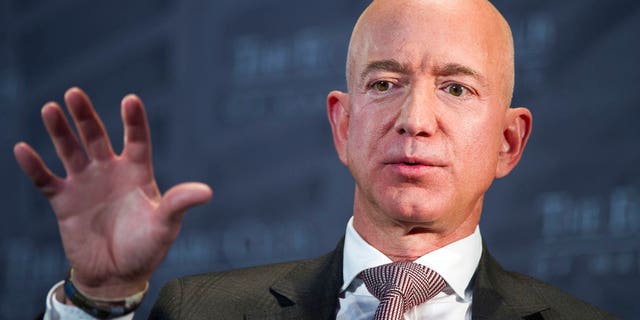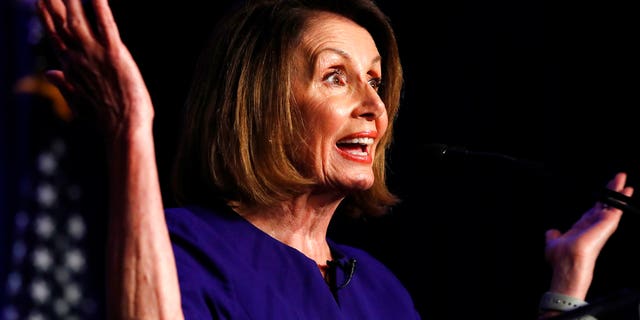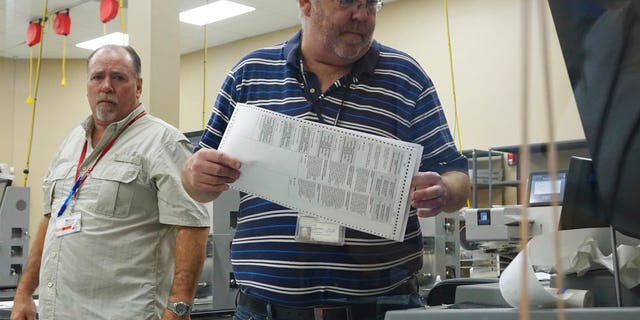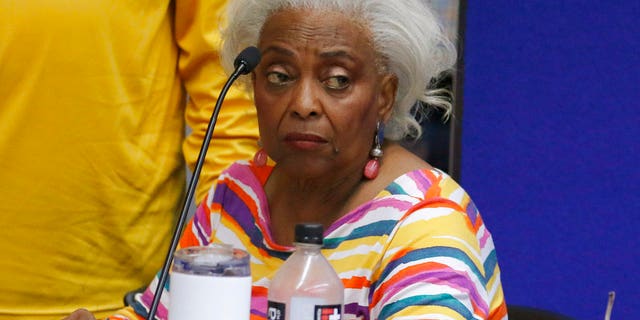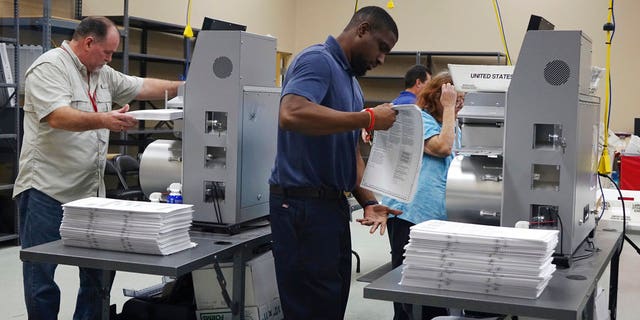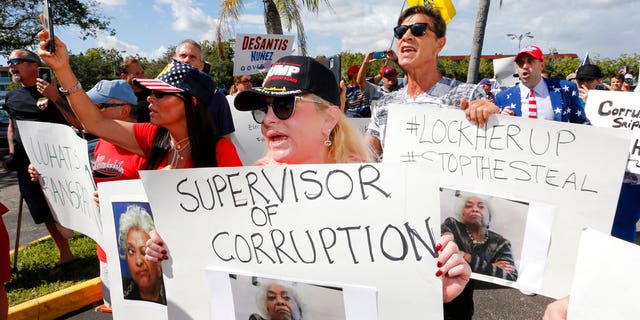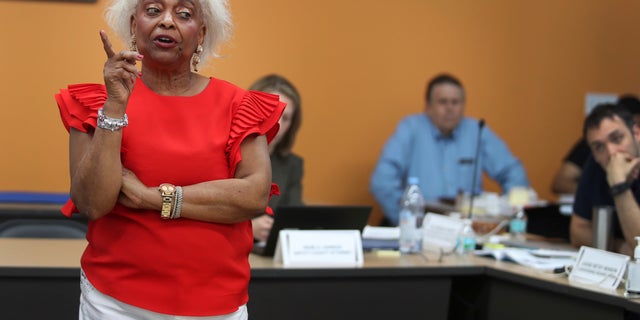The supervisor of elections in Florida's heavily Democratic Palm
Beach County said Sunday that she did not believe her department would
meet a Thursday deadline to complete recounts in the Sunshine State's
historically tight gubernatorial and Senate races, threatening to
further confuse an increasingly chaotic and politically fraught process.
The
supervisor, Susan Bucher, told reporters that she did not expect to
meet the deadline due to aging equipment. Florida Department of State
spokeswoman Sarah Revell told Fox News that under state law, if a county
does not submit their results by the deadline, then the results on file
at the time take their place. Revell added that Florida's Secretary of
State has no authority to grant extensions.
"Supervisors of
Elections are independent officials and they are responsible for
deciding when to upgrade or modernize their equipment," Revell added.
The
recount in most other major population centers, including Miami-Dade
and Pinellas and Hillsborough counties in the Tampa Bay area, were
taking place without incident on Sunday. Smaller counties are expected
to begin their reviews Monday, Tuesday or Wednesday.
Bucher spoke
hours after the campaign of Republican Senate candidate Rick Scott --
which secured an early legal victory against Democratic-leaning Broward
County officials over the weekend -- went back to court with a fresh
salvo of emergency complaints against both Broward and Palm Beach
counties. One complaint requests that state sheriff's officers "impound
and secure all voting machines, tallying devices and ballots when they
are not in use until the conclusion of the recount."
In a separate
lawsuit, Scott's team is asking a judge to throw out votes tallied by
the Broward County Canvassing Board after Saturday's noon deadline, in
apparent violation of state law, which requires that "[t]he canvassing
board shall submit ... unofficial returns to the Department of State for
each federal, statewide, state, or multicounty office or ballot measure
no later than ... noon on the fourth day after any general or other
election."
“The Broward and Palm Beach County Supervisors of
Elections has already demonstrated a blatant disregard for Florida’s
elections laws, making it more important than ever that we continue to
do everything possible to prevent fraud and ensure this recount is
operated responsibly," Chris Hartline, a Scott spokesman, said in a
statement.
Lawyer Marc Elias, who is representing the campaign of Democratic incumbent Sen. Bill Nelson, fired back on Twitter.
"Lets [sic]
be clear about what we are witnessing in Florida," Elias wrote. "The
sitting Governor is seeking to throw out lawful votes and seize the
voting equipment in order to win an election."
"Somebody needs to
cut down on the Red Bull," a Scott spokesperson wrote on Twitter, in
response to a statement by Florida Democrats Executive Director Juan
Penalosa that compared Scott to a Latin American dictator. "We requested
that ballots and voting machines be protected when not in use. The only
reason not to protect the integrity of the ballots and the voting
machines is if you are actively promoting or hoping for fraud."
But
Democrats continued to bash the Republican's effort. "If Rick Scott
wanted to make sure every legal ballot is counted, he would not be suing
to try and stop voters from having their legal ballot counted as
intended," Nelson said in a statement. "He's doing this for the same
reason he's been making false and panicked claims about voter fraud --
he's worried that when all the votes are counted he'll lose this
election. We will not allow him to undermine the democratic process and
will use every legal tool available to protect the rights of Florida
voters."
Unofficial results show that Republican former Rep. Ron
DeSantis led Democratic Tallahassee Mayor Andrew Gillum by 0.41
percentage points in the election for governor. In the Senate race,
Scott's lead over Nelson is 0.14 percentage points. State law requires a
machine recount in races where the margin is less than 0.5 percentage
points. Once completed, if the differences in any of the races are 0.25
percentage points or below, a hand recount will be ordered.
The
litigation threw yet another wrench in an increasingly chaotic process
reminiscent of the 2000 presidential election recount fiasco. In Broward
County, the scheduled start of the recount was delayed Sunday because
of a problem with one of the tabulation machines. The Republican Party
accused Broward's supervisor of elections, Brenda Snipes, of continuing
to compromise the process with "incompetence and gross mismanagement"
following the delay, which was resolved within two hours.
Election workers place ballots into electronic counting machines,
Sunday, Nov. 11, 2018, at the Broward Supervisor of Elections office in
Lauderhill, Fla. The Florida recount began Sunday morning in Broward
County. (Joe Cavaretta/South Florida Sun-Sentinel via AP)
Broward County election planning director Joe D'Alessandro told Fox News
that machines in Broward are currently resorting some 3.5 million pages
of ballots, and officials said that process could take more than 30
hours alone before any actual counting begins.
Broward County, the
state's second-most populous, is emerging as the epicenter of
controversy in the recount. Broward officials said they mistakenly
counted 22 absentee ballots that had been rejected, mostly because the
signature on the return envelope did not match the one on file.
Brenda Snipes, Broward County supervisor of elections, speaks with
officials before a canvassing board meeting Friday, Nov. 9, 2018, in
Lauderhill, Fla. (AP Photo/Joe Skipper)
It is a problem that appears impossible to fix
because the ballots were mixed in with 205 legal ballots. Snipes, who
has long been accused of mismanaging county elections and has been
sanctioned by a judge for destroying ballots in a 2016 congressional
race, said it would be unfair to throw out all the ballots.
"#BrowardElections
office admits the vote count they submitted to state includes 22
illegal votes," Florida GOP Senator Marco Rubio wrote on Twitter
Sunday. "We know about these 22 because they got caught breaking law in
reviewing 202 ballots. How can anyone trust more illegal votes aren’t in
their final count?"
Election workers place ballots into electronic counting machines,
Sunday, Nov. 11, 2018, at the Broward Supervisor of Elections office in
Lauderhill, Fla. The Florida recount began Sunday morning in Broward
County. (Joe Cavaretta /South Florida Sun-Sentinel via AP)
Undervoting -- a phenomenon in which voters don't
cast votes in all the races on the ballot -- has become a prominent
issue in the race. Rubio
pointed out that Broward County
is showing that approximately 25,000 fewer votes were cast in the
Senate race than the gubernatorial contest -- a significant
undervote that could be explained by Snipes' ballot design, which placed
the Senate contest directly below the ballot's instructions, out of
line with other races.
In 2006, the last time Nelson was on the
ballot alongside a gubernatorial race, only 4,100 fewer people in
Broward voted in the Senate race than in the election for governor.
(However, at the statewide level this year, 34,051 fewer people voted in
the Senate race than the gubernatorial race, a lower figure than the
35,736 undervote in 2006 -- even though 3 million more votes were cast
in 2018 compared to 2006.)
"How ironic would it be if those who
are now bashing our criticism of Snipes in the end wind up arguing that a
ballot design error made by her is the reason the Democrats lost?"
Rubio said Sunday.
Other Republicans suggested that Democrats shouldn't get their hopes up as the recounts get underway.
A crowd protests outside the Broward County Supervisor of
Elections office Friday, Nov. 9, 2018, in Lauderhill, Fla. A possible
recount looms in a tight Florida governor, Senate and agriculture
commission race. (AP Photo/Joe Skipper)
"Scott trails DeSantis by 10,754 votes in Broward,
and Nelson trails Gillum by 10,343," a Scott campaign source told Fox
News. "The idea that the undervotes in Broward County is an opportunity
for Nelson to significantly close the gap is not and has never been
based on anything but fantasy."
The recount in most other major
population centers, including Miami-Dade and Pinellas and Hillsborough
counties in the Tampa Bay area, was ongoing without incident on Sunday.
Smaller counties are expected to begin their reviews Monday, Tuesday or
Wednesday.
Republicans have repeatedly cried foul throughout the
process, both in court and outside Florida election offices. On
Saturday, GOP Rep. Matt Gaetz compared Broward County to a "banana
republic" and posted video apparently showing him being denied access to
election facilities on "safety" grounds.
Protesters chanted, "Lock her up" outside the building earlier in the day, referring to Snipes.
Rubio
and other Florida officials have posted numerous videos and images on
social media apparently showing boxes of ballots being left behind in
public spaces or improperly loaded onto private trucks.
At an
emergency court hearing on Friday, state Judge Carol-Lisa Phillips ruled
there has “been a violation of the Florida Constitution,” as well as
the state’s public records act, by Broward officials who had not turned
over requested records about the number of votes to be counted. But,
Gaetz said, Florida officials were still blocking Republicans from
monitoring how they were handling boxes of ballots.
"We have very
specific laws in the state to try to prevent fraud," Scott, the
incumbent Florida governor, told "Fox News Sunday" host Chris
Wallace. "We had to go to court to force the supervisor of elections in
Palm Beach County and Broward County to comply with the law, which is
there to prevent fraud."
Scott added: "Sen. Nelson is clearly
trying to commit fraud to win this election, that’s all this is." Asked
to elaborate on his accusation, he replied, "Well, it's his team."
"Sen. Nelson is clearly trying to commit fraud to win this election."
— GOP Senate candidate Rick Scott
"His
lawyers said that a noncitizen should vote, that’s one," Scott
continued. "Two, he’s gone to trial and said that fraudulent ballots
should be counted, ballots have already been thrown out because they
were not done properly. He said those should be counted."
JUDGE SIDES WITH RICK SCOTT, REPUBLICANS, ORDERS FLORIDA ELECTION OFFICIALS TO COMPLY WITH LAW
Lawyers
for Nelson and Gillum on Friday had objected to the rejection of a
provisional ballot cast by a noncitizen, according to a transcript
obtained by Fox News.
The incident occurred during a canvassing
meeting in Palm Beach County, where provisional ballots were being
examined. According to the draft transcript of the meeting, taken by a
court reporter hired by the Florida Republican Party, a provisional
ballot was ordered excluded from the count, as it came from a non-U.S.
citizen.
The Nelson campaign distanced itself from the objections, which it said that it had not authorized.
The
recount reviews are an unprecedented step in Florida, a state that's
notorious for election results decided by the thinnest of margins. State
officials said they weren't aware of any other time either a race for
governor or U.S. Senate in Florida required a recount, let alone both in
the same election.
Broward County Supervisor of Elections Dr. Brenda Snipes, gives an
update on the progress of ballots that are being counted from the
midterm election Thursday, Nov. 8, 2018. (Carline Jean/South Florida
Sun-Sentinel via AP)
Snipes, the Broward County election supervisor who
has held her office since 2003, is no stranger to controversy. Earlier
this year, Scott's administration said it was monitoring her office
after a judge ruled in May the county broke federal law by destroying
ballots in Rep. Debbie Wasserman Schultz's 2016 Democratic primary race
against Tim Canova, Politico reported.
Snipes claimed the issue had been "blown out of proportion."
In
August, a judge sided with the Florida GOP in its challenge of how the
county handled absentee ballots. Republicans claimed Snipes' office was
opening ballots in private, preventing people from challenging if they
were properly cast, according to Politico.
And then in 2016,
Broward County violated the law when it posted early voting results
online before polls even closed, the Miami Herald reported.
A crowd protests outside the Broward County Supervisor of
Elections office Friday, Nov. 9, 2018, in Lauderhill, Fla. Florida is
once again at the center of election controversy, but this year there
are no hanging chads or butterfly ballots like in 2000. And no angry
mobs in suits, at least not yet. (AP Photo/Joe Skipper)
TRUMP 'WATCHING CLOSELY' WHAT HAPPENS IN FLORIDA, SAYS DEMS TRYING TO STEAL ELECTIONS
As the recount unfolded, Republicans urged their Democratic opponents to give up and allow the state to move on.
Both
the state elections division, which Scott runs, and the Florida
Department of Law Enforcement have said they have found no evidence of
voter fraud. Gillum and Nelson have argued each vote should be counted
and the process allowed to take its course.
Florida is also
conducting a recount in a third statewide race. Democrat Nikki Fried had
a 0.07 percentage point lead over Republican state Rep. Matt Caldwell
in the race for agriculture commissioner, one of Florida's three Cabinet
seats.
From a distant glance, the recounts might dredge up
memories of the 2000 presidential recount, when it took more than five
weeks for Florida to declare George W. Bush the winner over Al Gore by
537 votes, thus giving Bush the presidency.
But much has changed
since then. In 2000, each county had a separate voting system. Many used
punch cards — voters poked out chads, leaving tiny holes in their
ballots representing their candidates. Some voters, however, didn't
fully punch out the presidential chad or gave it just a little push.
Those hanging and dimpled chads had to be examined by the canvassing
boards, a lengthy, tiresome and often subjective process that became
fodder for late-night comedians.
Now the state requires that all
Florida counties use ballots where voters use a pen to fill in a circle
next to their candidate's name, much like a student does when taking a
multiple-choice test. It also now clearly mandates how the recount will
proceed.
Those ballots are now being run through scanning machines
in each county for a second time under the watchful eye of
representatives of both parties and the campaigns. Any ballot that
cannot be read for any of the recounted races will be put aside.
If
a race's statewide margin falls below 0.25 percentage points after the
machine count, the state will order a manual recount in each county. At
that point, only the rejected ballots for that race will be examined by
counting teams to determine if the voters' intentions were obvious. For
example, some voters circle the candidate's name instead of filling in
the ballot correctly and some cross out their vote and then mark another
candidate.
If either side objects to a counting team's decision
or the team can't make one, the ballot will be forwarded to the county's
canvassing board, with the three members voting on the final decision.
The members are usually the county supervisor of elections, a judge and
the chair of the county commissioners.










